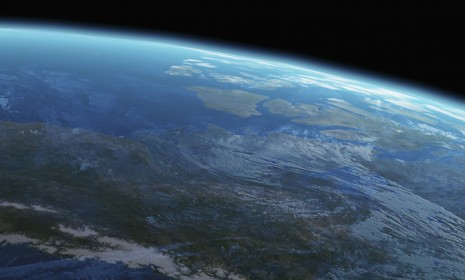Why we'll never find another planet like Earth
It doesn't matter how hard NASA looks, says Mark Fischetti at Scientific American. Until it identifies another planet with plants, Earth remains stubbornly unique

A free daily email with the biggest news stories of the day – and the best features from TheWeek.com
You are now subscribed
Your newsletter sign-up was successful
Every few days, it seems, NASA discovers a new exoplanet that could "potentially" be the next Earth. But the truth is, we'll never find another planet quite like ours, argues Mark Fischetti at Scientific American. While experts are hunting for a hospitable Earth 2.0 that boasts liquid water and human-friendly temperatures, they're ignoring one factor that gives our blue planet its inimitable properties: Plants. Far from being a mere byproduct of Earth's water and soil, our trees and flora helped shape the planet's entire surface. Green life "soaked up all the carbon dioxide from the atmosphere" over 450 million years ago, lowering temperatures enough to let other organisms thrive. And the roots of forests shaped our planet's riverbeds, allowing vegetation to grow while softening the soil for agriculture. Here, Fischetti explains why Earth is truly one of a kind:
Before the era of plants, water ran over Earth's landmasses in broad sheets, with no defined courses. Only when enough vegetation grew to break down rock into minerals and mud, and then hold that mud in place, did river banks form and begin to channel the water. The channeling led to periodic flooding that deposited sediment over broad areas, building up rich soil. The soil allowed trees to take root. Their woody debris fell into the rivers, creating logjams that rapidly created new channels and caused even more flooding, setting up a feedback loop that eventually supported forests and fertile plains. ...
Even if plants do sprout [on another planet], they will evolve differently, crafting a different surface on the orb they call home.
The Week
Escape your echo chamber. Get the facts behind the news, plus analysis from multiple perspectives.

Sign up for The Week's Free Newsletters
From our morning news briefing to a weekly Good News Newsletter, get the best of The Week delivered directly to your inbox.
From our morning news briefing to a weekly Good News Newsletter, get the best of The Week delivered directly to your inbox.
Read entire article at Scientific American.
A free daily email with the biggest news stories of the day – and the best features from TheWeek.com
-
 Why is the Trump administration talking about ‘Western civilization’?
Why is the Trump administration talking about ‘Western civilization’?Talking Points Rubio says Europe, US bonded by religion and ancestry
-
 Quentin Deranque: a student’s death energizes the French far right
Quentin Deranque: a student’s death energizes the French far rightIN THE SPOTLIGHT Reactions to the violent killing of an ultraconservative activist offer a glimpse at the culture wars roiling France ahead of next year’s elections
-
 Secured vs. unsecured loans: how do they differ and which is better?
Secured vs. unsecured loans: how do they differ and which is better?the explainer They are distinguished by the level of risk and the inclusion of collateral